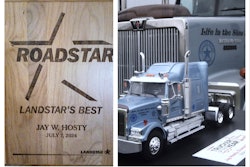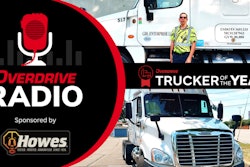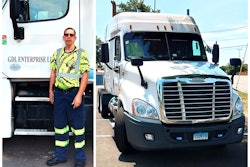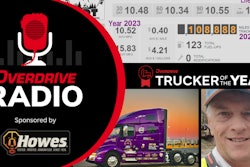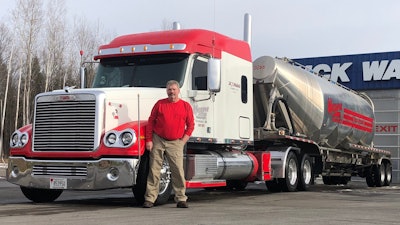
Mike Nichols grew up around trucking. His stepfather was in the Air Force Reserve -- when not on active duty, he drove a truck for a living. Nichols spent time with him on the road in his formative years, until a military plane crash took his stepfather’s life in 1982.
One of Nichols’ friends growing up worked on a family farm and drove trucks with his father, and Nichols worked for them, solidifying his connection to and interest in trucks and the trucking business.
Entering the workforce in earnest as an adult, his first job in trucking itself saw him working as a mechanic, yet he quickly figured out that wasn’t for him. He took the money that had been saved for his college education and bought his first truck at just 18, in January 1986 -- the 1980 Kenworth cabover was powered by a 350-hp Big Cam Cummins. He also bought a dump trailer and drove it intrastate in Illinois, where he grew up and lived at the time.
Not long after, he bought a 1984 Peterbilt 359, which his friend ended up driving, and drove his friend’s 1984 Pete 362 cabover.
In May of 1987, however, tragedy struck. His wife, Lesa, was killed in a car accident just two months and two days after their wedding. Nichols, also in the car, sustained numerous injuries himself -- a broken arm, several broken ribs, and more. He sold his ’84 359 and took six-to-seven months off to recuperate.

When he returned to work, it'd be as an employee in a straight truck delivering feed to farms. Then driving for a meat-packing plant out of DeKalb, Illinois, hauling fresh meat daily to Chicago O’Hare International Airport. Then “they wanted me to haul livestock for them, and so I kind of went to the school of hard knocks on that," with no prior experience.
He'd bounce around with a few different employers through the early ‘90s, eventually questioning whether trucking was right for him. In 1993, he ran out to Colorado and flight school, got his private pilot's license and “was going to work my way up and get an Instrument [rating] and a commercial" license. The time and money required to get enough flight hours, though, just wasn’t going to work.
The move wasn’t a total waste, though. “A lot of things I learned in flight school as far as prioritization and what they call cockpit resource management, a lot of those same fundamentals really apply to trucks, too,” he said. Despite being on the ground instead of in the air, “how you prioritize things, how you keep your eyes moving," he said, proved key to long-term safety. "The saying in aviation is aviate, navigate, communicate, in that order. Just substitute operate for aviate, and I think that’s kind of the same thing with trucking.”
It's served him well. Nichols now operates as a successful owner leased to Wayne Transports pulling dry bulk tankers loaded with food-grade products. Beyond that, he’s a vocal advocate for small-business truckers, speaking with various media outlets on important issues.
His experience and success in the business earned Nichols the nod as Overdrive’s Trucker of the Month for July, putting him in the running for the 2024 Trucker of the Year award.
 Overdrive's 2024 Trucker of the Year program, sponsored by Commercial Vehicle Group and Bostrom Seating, recognizes clear business acumen and unique or time-honored recipes for success among owner-operators. Through October, we're naming Truckers of the Month to contend for the Trucker of the Year honor. Finalists will be named in December, and a winner crowned early next year. Nominations continue to be sought for exceptional owner-operators, whether leased or independent, throughout the year. Nominate your business or that of a fellow owner (up to three trucks) via this link for a chance to win a custom replica of your tractor and a Bostrom seat from Commercial Vehicle Group, among other perks.
Overdrive's 2024 Trucker of the Year program, sponsored by Commercial Vehicle Group and Bostrom Seating, recognizes clear business acumen and unique or time-honored recipes for success among owner-operators. Through October, we're naming Truckers of the Month to contend for the Trucker of the Year honor. Finalists will be named in December, and a winner crowned early next year. Nominations continue to be sought for exceptional owner-operators, whether leased or independent, throughout the year. Nominate your business or that of a fellow owner (up to three trucks) via this link for a chance to win a custom replica of your tractor and a Bostrom seat from Commercial Vehicle Group, among other perks.
[Related: Eyes on the big climb: Careful prep the name of the game for Trucker of the Month]
Long, winding road leads back to trucking
By 1998, Nichols had returned to the Midwest, this time to Wisconsin, where he lives today in Chippewa Falls. Trucking business ownership, he decided, would be his goal. He bought a brand-new 1998 Peterbilt 379 and 48-foot spread-axle Utility reefer. He leased the rig on with a neighbor who was operating a few trucks and worked under that authority, primarily hauling for brokers, for the next few years.
The 379 he named the “Lesa Marie” after his late wife. It ended up a lemon. Powered by a 500-hp Cat 3406E with an 18-speed, from the time it was new it came with a “vibration," he said, "they just never could figure out." Technicians from Meritor, Cat and Peterbilt all looked over the truck numerous times. Stumped, at wit's end on how to fix it, Peterbilt ultimately bought the truck back under Wisconsin’s unique Lemon Law (one of the only such state laws nationwide that applies to commercial trucks) and compensated Nichols for finance interest, payments and attorney’s fees.
The experience soured the owner-operator on truck ownership for a time -- he went to work in public advocacy, including for the attorney who helped him with his Lemon Law case.
Yet the old saying about diesel running in the very blood of truly committed truckers proved true for Nichols. He got back behind the wheel in 2004, hauling gasoline around the Milwaukee, Madison and southern Wisconsin areas for a few years. He moved into the back office in 2008, doing dispatch and operations for another tanker outfit.
By 2016-'17, the road called him again, and Nichols went to work delivering dry ice for a company out of Minnesota, then pulling gas tankers for a small fleet. The owner of that company “encouraged me to maybe look at buying a truck," at which point he would lease on with the company. The truck that he took on he called the “Lesa Marie II,” a 2013 Freightliner Coronado glider, purchased in 2018. That deal ultimately didn’t work out -- the small fleet owner decided to get out of the trucking business. But the seeds were sewn for Nichols' growth at a long-term home for his business.
 Nichols initially planned to keep the Lesa Marie II, pictured here, longer than he did, but not long after its purchase the Environmental Protection Agency put glider kits in its crosshairs. With 600,000 miles on the odometer when Nichols bought the 2013, he decided to upgrade while he could still buy a glider and pivoted to a newer-model truck as a result, with a goal of it lasting longer into his career.
Nichols initially planned to keep the Lesa Marie II, pictured here, longer than he did, but not long after its purchase the Environmental Protection Agency put glider kits in its crosshairs. With 600,000 miles on the odometer when Nichols bought the 2013, he decided to upgrade while he could still buy a glider and pivoted to a newer-model truck as a result, with a goal of it lasting longer into his career.
The small fleet owner suggested he should look into leasing on with Wayne Transports.
Wayne Transports fuel-haul side wasn't taking on new lease contracts at the time, but Dan Anderson, Wayne’s operations manager for dry bulk, agreed to bring Nichols' business on in November of 2018.
“I wish I would have found them 30 years ago,” Nichols said. “Would have saved me a lot of time and money and grief. I can’t say enough good things about Wayne.”
In the nearly six years he's hauled in the Wayne operation under Anderson, “I have witnessed firsthand his exceptional qualities as a truck driver, leader, and advocate for the industry,” Anderson said. “Mike stands out for his profound understanding of the trucking industry. He is not just a driver; he possesses a deep-seated knowledge of regulations, logistics, and the challenges faced by owner-operators. This cerebral approach extends to his work ethic, where he consistently approaches problems with an analytical and well-informed perspective.”
Nichols replaced the glider in 2020 with the Lesa Marie III, taking delivery of the 2020 Coronado he still operates today in February 2021. The truck, also purchased as a glider, features a pre-emissions 14-liter Detroit Series 60 DDEC IV, which Nichols said is something of a rare motor. As he’s been told, “Detroit only made those without the EGR for a short amount of time.”
[Related: Man's mastery of the freight machine, with a firm hand in Amazon's system]
 The Lesa Marie III features a Thermo King TriPac Evolution APU, a PDI tune, 7-inch Lincoln Chrome stacks, a Filtrate Solutions FS2500 bypass oil filter, rear-facing cameras on both side mirrors and more.
The Lesa Marie III features a Thermo King TriPac Evolution APU, a PDI tune, 7-inch Lincoln Chrome stacks, a Filtrate Solutions FS2500 bypass oil filter, rear-facing cameras on both side mirrors and more.
A firm hand on maintenance, business, with dependable partners
Knowing your limitations is a virtue when it comes to business ownership. Nichols certainly recognizes that. Despite his early diesel-mechanic experience, “I’m not the greatest mechanic,” he said. “Other people can do that job a lot better than I can.”
When he's home, Nichols parks the truck at JR Truck Repair & Fabrication there in Chippewa Falls, and owners Adam and Katoria Pratt handle all of his maintenance. “It’s almost like having your own pit crew,” Nichols said of the work done at the shop.
He’s on a strict maintenance schedule and wants somebody looking at the truck at least once or twice a month, going over preventive measures, greasing, doing inspections, changing the oil every 10,000-15,000 miles and so much more.
“Mike keeps his truck in great operating condition and is very meticulous about how and when things get completed,” the Pratts said. “He takes pride in his truck; just as much as we take pride in our work” on it.
Where Nichols goes outside of Wayne Transports’ in-house maintenance offer for contractors, he also looks elsewhere for health insurance, opting for an Affordable Care Act plan. He said he’s hoping to make a switch at some point, potentially to a cost-sharing plan.
[Related: Health-share plans prove attractive alternative to insurance for owner-ops, small fleets]
All the same, he's getting plenty value out of his lease contract. Pulling a bulk pneumatic tanker would be cost-prohibitive as an independent, he feels, given the high cost of the trailer as well as the washouts after each load, not to mention added maintenance and the like. Leasing to Wayne, too, he said, is “worth giving up the percentage that they take” because they handle billing, permitting, offer a fuel card, insurance and other benefits.
Even with tough business conditions for owner-operators the last couple of years, Nichols said he’s done well, with help from a fuel surcharge passed on by Wayne to its contractors. Looking at his bottom line for the last two years, he did better in ’22 than in ’23 because of the high fuel prices and the fuel surcharge that came along with them.
Wayne also covers detention, compensating owner-operators by the hour if they’re kept at a customer’s facility longer than a couple of hours.
Nichols handles day-to-day bookkeeping and expense tracking, and a CPA manages his tax prep and other business necessities.
He's a little bit behind 2023 so far this year on his numbers. It's not rates declines that are hitting him, though. Rather, he had a deer strike in March that put his truck down temporarily, and in January he was out for about two weeks with an illness. Since the Spring, though, he’s “still kind of playing catch-up from being off a little bit, but we’re getting there.”
Advocacy, advice for the long haul
 Enter your business in Overdrive's Trucker of the Year competition for a chance to win a seat from program sponsor Bostrom Seating, among other perks and prizes.
Enter your business in Overdrive's Trucker of the Year competition for a chance to win a seat from program sponsor Bostrom Seating, among other perks and prizes.
Wayne Transports’ Dan Anderson said Nichols’ advocacy is what really sets him apart as an owner-operator.

How do owner-operators and small fleets survive and thrive in tough economic times?Find out in this webinar.
Join us for a live webinar Aug. 22 at 1 p.m. CT and hear from owner-operators and small fleets as we discuss how they prepared during the good times to weather the storms.
“He is a vocal supporter of fair treatment for owner-operators," Anderson said, "actively participating in online forums and discussions related to industry issues.”
Nichols, 56, has plenty of road left in his career, and builds savings through retirement plans he calls fairly "modest" at this point. Yet retirement isn't really in his vocabulary. He said he'd “really like to see myself driving as long as I pretty much can, assuming everything else stays the same, assuming there’s still human drivers in trucks. … I feel like I want to drive, to do what I’m doing, until they throw dirt on one of us.”
For up-and-coming owner-operators or those considering jumping into ownership, Nichols cautions all to take great care with regard to financing terms when shopping around for a truck. Look beyond the dealership where you’re buying the truck -- “oftentimes, if you’ve got decent credit, you can find a better rate than going through the dealership where you’re [buying] it. I mean, they’re making money on that rate just like they’re making money on selling you the truck.”
He said he personally saved himself about 2.5% in interest by financing through a local bank with his most recent purchase.
He also advises owners of the tried-and-true insurance against trucking's next inevitable down cycle and your own maintenance emergency -- always keep reserve cash handy.
He's also an advocate of the safety side, urging truck drivers and the average motorist alike of the single thing all could do to improve conditions on-highway: increase following distance as much as you can. Virtually “nobody respects following distance anymore,” he said. “A huge percentage of people are driving within a second” of the vehicle in front of them.
He sees trucks at cruising speed with less than a truck length between their front bumper and the vehicle in front of them, and “I don’t know how you can go down the road like that," he added. "I mean, my anxiety wouldn’t allow me to do that. I don’t want to be a participant in an accident. I would much rather be a witness.”
Enter your own or another deserving owner's business (up to 3 trucks) in Overdrive's 2024 Trucker of the Year competition via this link.
Hear interviews with this year's Truckers of the Month via the Overdrive Radio playlist below.

